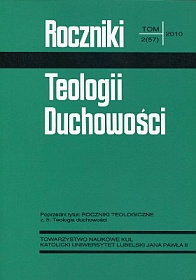The Religious Experience that Parents of the Children who Prepare for their First Holy Communion Have
Abstract
The term “experience” is an ambiguous concept, both in the colloquial and scholarly language. One of the kinds of experience is religious experience that consists in man's immediate contact with religious reality. Understanding, feeling, intuition and personal, independent encounter with sacrum are essential elements of this experience. Sociologists distinguish several indexes of religious experience: feeling of nearness of God, emotional attachment to the Supreme Being, meaning of life, sense of security, aid in everyday life, aid in difficult situations, aid in the final hour of life. In the present article religious experience is analyzed with respect to the characteristics of the period of adulthood. It is the period of life that is interesting not only from the point of view of psychology, but also of religion and spirituality. It is in this period that we witness ultimate formation of one's identity, of integration of one's real and ideal ego, of a mature personality and of mature religiousness. Hence, it may be said that the quality and intensity of religious experience in this developmental period is especially interesting. The final part of the article has an empirical character, as it concerns studies of parents of children who are preparing for their First Holy Communion. It is worth stressing that this pastoral situation has a great significance not only for the children's religious life, but also for that of their parents'.
References
Benedykt XVI, Encyklika Deus caritas est, Watykan 2005.
Benedykt XVI, Adhortacja apostolska „Sacramentum caritatis”, Watykan 2007.
Betz 0., Zugänge zur religiösen Erfahrung, Düsseldorf 1980.
Chlewiński Z., Dorosły, w: Encyklopedia Katolicka, t. IV, Lublin 1985, kol.123-125.
Chmielewski M., Doświadczenie duchowe, w: Leksykon duchowości katolickiej, red. M. Chmielewski, Lublin−Kraków 2002.
Field T. M., Widmayer S. M., Marrige and family, w: Handbook of the psychology of aging, red. B. B. Wolman, New York 1982.
Głaz S., Zagadnienie doświadczenia religijnego, Kraków 1995.
Gurba E., Wczesna dorosłość, w: Psychologia rozwoju człowieka. Charakterystyka okresów życia człowieka, red. B. Harwas-Napierała, J. Trempała, t. II, Warszawa 2001.
Jan Paweł II, Ecclesia de Eucharistia, Watykan 2003.
Kaczmarek P., Kwestionariuszowe obrazy świata. Przypadek polskiej religijności, „Kultura i Społeczeństwo” 2003, nr 1.
Kosslyn S. M., Rosenberg R. S., Psychologia. Mózg. Człowiek. Świat, Kraków 2006.
Krzysteczko H., Doświadczenie religijne, w: Leksykon teologii pastoralnej, red. R. Kamiński, Lublin 2006, s. 187-191.
Labouvie-Vief G., Dynamic development and mature autonomy. A theoretical prologue, „Human Development” 25(1982), s. 161-191.
Mariański J., Doświadczenie religijne, w: Leksykon socjologii religii. Zjawiska – badania – teorie, red. M. Libiszowska-Żółtkowska, J. Mariański, Warszawa 2004, s. 84-88.
Olejnik M.. Średnia dorosłość. Wiek średni, w: Psychologia rozwoju człowieka. Charakterystyka okresów życia człowieka, t. II, red. B. Harwas-Napierała, J. Trempała, Warszawa 2001.
Stepulak M., Wybrane zagadnienia z psychologii religii, Siedlce 1996.
Stepulak M., Wybrane zagadnienia z psychologii rozwojowej, Siedlce 2001.
Zdybicka Z., Doświadczenie religijne, w: Encyklopedia Katolicka, t. IV, Lublin 1985, kol. 156-159.

